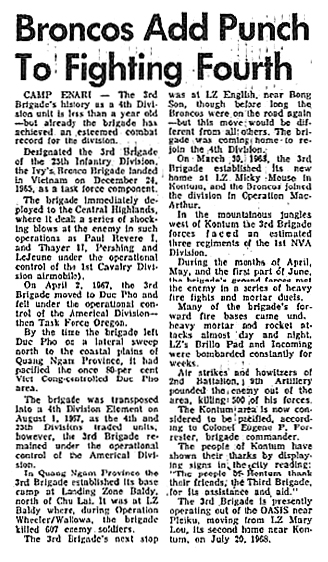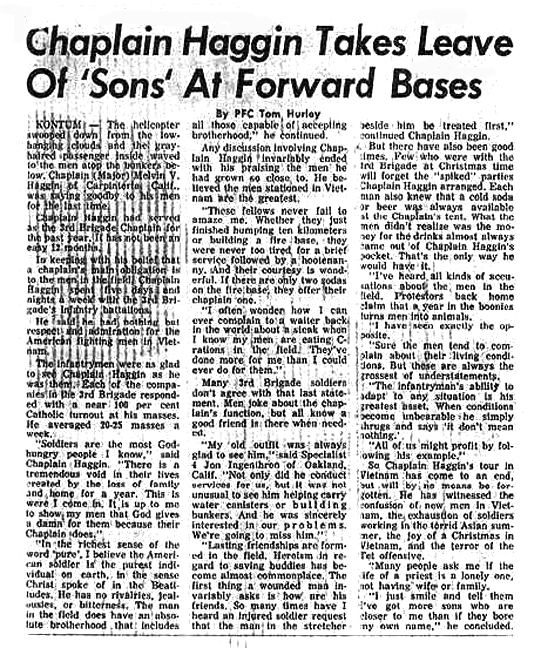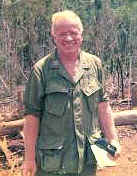 |
|
 |
 |
|
 |
Newspaper Articles
about the 3rd Brigade
 CAMP ENARI -- The 3rd Brigade's history as a 4th
Division unit is less than a year old - but already the brigade has
achieved an esteemed combat record for the division.
CAMP ENARI -- The 3rd Brigade's history as a 4th
Division unit is less than a year old - but already the brigade has
achieved an esteemed combat record for the division.Designated the 3rd Brigade of the 25th Infantry Division, the Ivy's Bronco Brigade landed in Vietnam on December 24, 1965, as a task force component. The brigade immediately deployed to the Central Highlands, where it dealt a series of shocking blows at the enemy to such operations as Paul Revere I, and Thayer II, Pershing and LeJeune under the operational control of the 1st Cavalry Division airmobile. On April 2, 1967, the 3rd Brigade moved to Duc Pho and fell under the operational control of the Americal Division - then Task Force Oregon. By the time the brigade left Duc Pho on a lateral sweep north to the central plains of Quang Ngan Province, it had pacified the once 80-percent Viet Cong-controlled Duc Pho area. The brigade was transposed into a 4th Division Element on August 1, 1967, as the 4th and 25th Division traded units, however, the 3rd Brigade remained under the operational control of the Americal Division. In Quang Ngan Province the 3rd Brigade established its base camp at Landing Zone Baldy, north of Chu Lai. It was at LZ Baldy where during Operation Wheeler/Wallowa, the brigade killed 607 enemy soldiers. The 3rd Brigade's next stop was at LZ English, near Bong Son, though before long the Broncos were on the road again - but this move would be different from all others. The brigade was coming home to rejoin the 4th Division. On March 30, 1968 [date hard to read], the 3rd Brigade established its new home as LZ Mickey Mouse in Kontum and the Broncos joined the division in Operation MacArthur. In the mountainous jungles west of Kontum the 3rd Brigade forces faced an estimated three regiments of the 1st NVA Division. During the months of April, May, and the first part of June, the brigade's ground forces met the enemy in a series of heavy fire fights and mortar duels. Many of the brigade's forward fire bases came under heavy mortar and rocket attacks almost day and night. LZ's Brillo Pad and Incoming were bombarded constantly for weeks. Air strikes and howitzers of 2nd Battalion, 9th Artillery pounded the enemy out of the area, killing 500 of his forces. The Kontum area is now considered to be pacified, according to Colonel Eugene P. Forrester, brigade commander. The people of Kontum have shown their thanks by displaying signs in the city reading: "The people of Kontum thank their friends; the Third Brigade, for the assistance and aid." The 3rd Brigade is presently operating out of the OASIS near Pleiku, moving from LZ Mary Lou, its second home near Kontum, on July 20, 1968. |
Father Haggin
 KONTUM-- The helicopter swooped down from the
low-hanging clouds and the gray-haired passenger inside waived to the men
atop the bunkers below. Chaplain (Major) Melvin V. Haggin of
Carpinteria, Calif., was saying goodby to his men for the last time.
KONTUM-- The helicopter swooped down from the
low-hanging clouds and the gray-haired passenger inside waived to the men
atop the bunkers below. Chaplain (Major) Melvin V. Haggin of
Carpinteria, Calif., was saying goodby to his men for the last time.Chaplain Haggin had served as the 3rd Brigade Chaplin for the past year. It has not been an easy 12 months. In keeping with his belief that a chaplain's main obligation is to the men in the field, Chaplain Haggin spent five days and nights a week with the 3rd Brigade's Infantry battalions. He said he had nothing but respect and admiration for the American fighting men in Vietnam. The infantrymen were as glad to see Chaplain Haggin as he was them. Each of the companies in the 3rd Brigade responded with a near 100 per cent Catholic turnout at his masses. He averaged 20-25 masses a week. "Soldiers are the most God-hungry people I know," said Chaplain Haggin. "There is a tremendous void in their lives created by the loss of family and home for a year. This is where I come in. It is up to me to show my men that God gives a damn for them because their Chaplain does." "In the richest sense of the word 'pure,' I believe the American soldier is the purest individual on earth. In the sense Christ spoke of in the Beatitudes. He has no rivalries, jealousies, or bitterness. The man in the field does have an absolute brotherhood that includes all those capable of accepting brotherhood," he continued. Any discussion involving Chaplain Haggin invariably ended with his praising the men he had grown so close to. He believed the men stationed in Vietnam are the greatest. "These fellows never fail to amaze me. Whether they just finished humping ten kilometers or building a fire base, they were never too tired for a brief service, followed by a hootenanny. And their courtesy is wonderful. If there are only two sodas on the fire base, they offer their chaplain one. "I often wonder how I can ever complain to a waiter back in the world about a steak when I know my men are eating C-rations in the field. They've done more for me than I could ever do for them." Many 3rd Brigade soldiers don't agree with that last statement. Men joke about the chaplain's function, but all know a good friend is there when needed. "My old outfit was always glad to see him," said Specialist 4 Jon Ingent... of Oakland, Calif. "Not only did he conduct services for us, but it was not unusual to see him helping carry water canisters or building bunkers. And he was sincerely interested in our problems. We're going to miss him."  "Lasting friendships are formed in the field. Heroism in regard to
saving buddies has become almost commonplace. The first thing a
wounded man invariably asks is how are his friends. So many times
have I heard an injured soldier request that the man in the stretcher
beside him be treated first," continued Chaplain Haggin.
"Lasting friendships are formed in the field. Heroism in regard to
saving buddies has become almost commonplace. The first thing a
wounded man invariably asks is how are his friends. So many times
have I heard an injured soldier request that the man in the stretcher
beside him be treated first," continued Chaplain Haggin.But there have also been good times. Few who were with the 3rd Brigade at Christmas time will forget the "spiked" parties Chaplain Haggin arranged. Each man also know that a cold soda or beer was always available at the Chaplain's tent. What the men didn't realize was the money for the drinks almost always came out of Chaplain Haggin's pocket. That's the only way he would have it. "I've heard all kinds of accusations about the men in the field. Protestors back home claim that a year in the boonies turns men into animals. "I have seen exactly the opposite." "Sure the men tent to complain about their living conditions. But those are always the grossest of understatements. The infantryman's ability to adapt to any situation is his greatest asset. When conditions become unbearable he simply shrugs and says 'it don't mean nothing.' "All of us might profit by following his example." So Chaplain Haggin's tour in Vietnam has come to an end, but will by no means be forgotten. He has witnessed the confusion of new men in Vietnam, the exhaustion of soldiers working in the torrid Asian summer, the joy of a Christmas in Vietnam, and the terror of the Tet offensive. "Many people ask me if the life of a priest is a lonely one, not having wife or family. "I just smile and tell them I've got more sons who are closer to me than if they bore my own name," he concluded. |